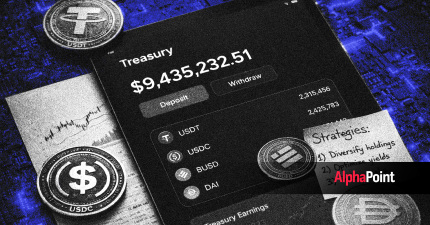Understanding How Spot Bitcoin ETFs and Bitcoin Futures ETFs Work
While cryptocurrency has piqued the interest of many investors, some remain hesitant to hold digital assets directly. For cautious investors seeking diversification, Bitcoin exchange-traded funds (ETFs) offer a more familiar and manageable entry point into the crypto market.
Bitcoin ETFs track the performance of Bitcoin (BTC) without requiring investors to manage or trade the actual cryptocurrency. This allows them to profit from market movements without the complexities of handling the underlying assets themselves.
As cryptocurrency and fintech evolve, a deeper understanding of Bitcoin ETFs can help crypto exchanges and financial institutions attract a broader range of clients.
In this post, we’ll explore everything you need to know about these powerful investment vehicles and how they can expand your portfolio.
Types of Bitcoin ETFs
A Bitcoin exchange-traded fund (ETF) generally falls into one of two categories: spot Bitcoin ETFs and Bitcoin futures ETFs. Let’s look at how they differ:
Spot Bitcoin ETFs
Spot Bitcoin ETFs track the price of Bitcoin by holding actual BTC, giving investors direct exposure to the cryptocurrency’s price movements without having to purchase it themselves. The Bitcoin held is secured and recorded on the blockchain, a decentralized ledger that ensures transparency and security. If the value of Bitcoin increases, the investment’s value typically rises as well.
This regulatory green light fueled rapid growth, with U.S. spot Bitcoin ETFs reporting approximately $28 million in net inflows as of September 2024, underscoring the high demand from investors.
In January 2024, the U.S. Securities and Exchange Commission approved firms like Invesco, Grayscale, Fidelity, and BlackRock to launch spot Bitcoin ETFs, opening the door for these investment products in the U.S. market. While there were already crypto-related ETFs and trusts on the market prior to this, there had never been a spot Bitcoin ETF before this 2024 approval. These ETFs are the first cryptocurrency funds to trade on a major exchange and hold Bitcoin directly.
The spot ETFs currently being traded in the U.S. includes (but is not limited to):
- iShares Bitcoin Trust ETF
- Grayscale Bitcoin Trust
- Fidelity Wise Origin Bitcoin Fund
- ARK 21Shares Bitcoin ETF
- Bitwise Bitcoin ETF Trust
- VanEck Bitcoin ETF
- Coinshares Valkyrie Bitcoin Fund
- Invesco Galaxy Bitcoin ETF
- Franklin Bitcoin ETF
- WisdomTree Bitcoin Fund
Bitcoin Futures ETFs
Bitcoin futures ETFs are based on contracts that speculate on the future price of Bitcoin, allowing investors and asset managers to profit from changes in its value over time. These contracts involve agreements to buy or sell BTC at a predetermined price on a specific date.
Instead of holding actual Bitcoin, these ETFs provide indirect exposure to Bitcoin’s price movements through these contracts. Investors can register profits based on the difference between the contract price and the spot price at the time of the exchange.
How Spot Bitcoin ETFs Work
Here’s a more in-depth look into how spot Bitcoin ETFs operate:
Underlying Asset
Spot Bitcoin ETFs hold actual BTC, giving investors direct exposure to the cryptocurrency‘s real-time price and potential security risks.
To ensure investor protection, funds store BTC in secure digital vaults, often utilizing cold storage — where the cryptocurrency is kept offline in hardware devices to safeguard it from hacking and theft.
Shares Representation
Investors in spot Bitcoin ETFs purchase shares that represent proportional ownership of the Bitcoin held by the fund. The value of these shares is tied to Bitcoin’s market price.
For example, during events like Bitcoin halving (when the rate of new Bitcoin creation slows), share values may increase as Bitcoin’s price rises, since the two are directly correlated.
Trading and Liquidity
Bitcoin ETF shares are traded on traditional stock exchanges, with market makers helping to ensure liquidity and smooth transactions.
This setup allows investors to easily buy and sell shares through their brokerage accounts, providing straightforward access to the digital currency market without the need for a digital wallet.
Pricing and Management
Spot Bitcoin ETFs reflect Bitcoin’s real-time market price and are continuously rebalanced by buying and selling tokens. This gives investors exposure to the same price movements as typical crypto exchange traders without holding the asset directly.
However, this comes at a price. Firms that offer these investments charge management fees to cover the cost of maintaining the fund on behalf of their investors.
How Bitcoin Futures ETFs Work
Bitcoin Futures ETFs invest in futures contracts tied to Bitcoin, rather than holding the cryptocurrency itself. Here’s how they work:
Futures Contracts
These ETFs invest in Bitcoin futures contracts that derive value from Bitcoin price movements rather than holding digital currency. These contracts are agreements to buy or sell Bitcoin at a specific price on a future date.
Funds can register gains or losses based on the difference between the contract price and Bitcoin’s market price at the time of settlement.
No Direct Bitcoin Ownership
Unlike spot Bitcoin ETFs, futures ETFs don’t hold Bitcoin directly. Instead, they track its price through regulated futures contracts. This reduces risks associated with storing the actual currency, such as theft or hacking.
Pricing Dynamics
Bitcoin futures ETF prices don’t always match Bitcoin’s spot prices. This discrepancy can result from market conditions like contango, where futures prices exceed spot prices, or backwardation, where futures prices are lower.
Contango often occurs due to high holding costs or strong market optimism, with investors willing to pay a premium if they expect Bitcoin’s value to rise. Conversely, backwardation happens when the current demand for Bitcoin is high, but future demand is expected to drop, leading to lower futures prices.
Share Issuance and Trading
Similar to spot Bitcoin, ETFs issue shares representing ownership in these investments. The only difference is that the shares represent futures contracts instead of the actual currency.
These shares are traded on traditional stock exchanges, making them easily accessible to investors.
Advantages of Spot Bitcoin ETFs and Bitcoin Futures ETFs
Spot Bitcoin ETFs and Bitcoin futures ETFs offer unique benefits, providing different avenues for investors to diversify and enhance their overall investment strategy. Whether seeking direct Bitcoin exposure or using futures contracts to mitigate risks, these ETFs allow investors to integrate the cryptocurrency asset class into their broader financial plan.
Spot Bitcoin Advantages
- Lower barriers to entry: Spot Bitcoin ETFs are easier to access than actual Bitcoin. Investors don’t need to navigate crypto exchanges, manage crypto wallets, or safeguard their assets since the funds do that for them.
- Direct exposure to Bitcoin price movements: Funds hold actual Bitcoin, allowing investors to benefit from the asset’s price appreciation.
- Limited risk of pricing mismatch: Funds track Bitcoin’s spot price, minimizing the risk of pricing discrepancies.
- Traded on traditional stock exchanges: Spot Bitcoin ETFs trade like traditional securities, making it easier for mainstream investors to diversify their portfolios.
Bitcoin Futures Advantages
- Regulatory oversight: Futures contracts are regulated by the Commodity Futures Trading Commission (CFTC), ensuring clarity and security for investors.
- Limited security risk: Since Bitcoin futures don’t hold actual cryptocurrency, they face fewer risks, such as hacking or theft.
- Ability to profit from Bitcoin price drops: Investors who short futures contracts can profit even when prices drop.
- Traded on stock exchanges: Futures ETFs offer improved liquidity, making them accessible and efficient for a broad range of investors.
The Role of AlphaPoint in Building Digital Infrastructure for Cryptocurrency Exchanges
Spot Bitcoin ETFs and Bitcoin futures ETFs are prime options for mainstream investors aiming to diversify their portfolios with crypto assets. Spot Bitcoin ETFs provide direct exposure to the cryptocurrency market by holding actual Bitcoin, while futures ETFs rely on futures contracts.
AlphaPoint enables you to attract both institutional investors offering these investment vehicles and retail investors looking to invest in crypto ETFs by helping you build your cryptocurrency exchange. Our fully customizable white-label exchange software ensures seamless support for both spot and futures ETFs, tailored to meet your specific needs.
Ready to launch your crypto exchange? Schedule a demo with AlphaPoint today!


